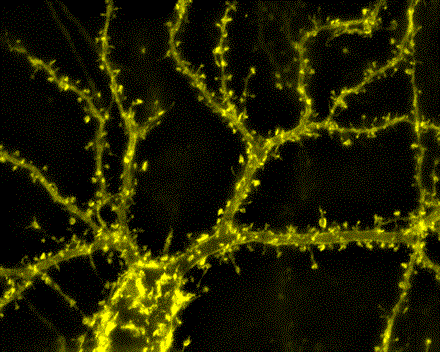Researchers from NYU Langone Medical Center have found evidence that sleep promotes memory by strengthening dendritic spines that grow during learning tasks. The study, published this month, was led by Guang Yang, Cora Sau Wan Lai, Joseph Cichon, Lei Ma, Wei Li and Wen-Biao Ga set out to discover the means by which sleep helps learning and memory, which are currently unknown.
 Yang et al. observed memories forming and strengthening in mice. When the mice learned motor tasks, “spines”–protuberances–formed on dendritic branches of specific neurons. These sp
Yang et al. observed memories forming and strengthening in mice. When the mice learned motor tasks, “spines”–protuberances–formed on dendritic branches of specific neurons. These sp ines represent the formation of a new memory. Such dendritic structures are subject to strengthening and decay.
ines represent the formation of a new memory. Such dendritic structures are subject to strengthening and decay.
When mice slept after forming a new memory, the spines were retained better. Not only that: the researchers observed the refiring of neurons that had fired during learning. The refiring occurred during slow-wave sleep. Another way of phrasing this finding is that sleep after motor learning promotes the formation of postsynaptic dendritic spines on a subset of branches of individual layer V pyramidal neurons.
Slow wave is deep sleep. when EEG activity is synchronized, producing slow waves with a low frequency and relatively high amplitude. Slow wave sleep has two stages: a down state in which neurons in the neocortex are silent and at rest, and a up state in which neurons fired excitedly for a brief period. Slow wave sleep proceeds REM sleep.
The research findings have brought science one step closer to understanding the process of sleep. The findings indicated to the NYU team that sleep has a key role in promoting learning-dependent synapse formation and maintenance on selected dendritic branches, and contribute to the storage of memories.
By Sid Douglas
